| Listing 1 - 10 of 23 | << page >> |
Sort by
|

ISBN: 0807876291 9780807876299 0807828823 9780807828823 0807855537 9780807855539 9798890873231 Year: 2004 Publisher: Chapel Hill ; London : The University of North Carolina Press,
Abstract | Keywords | Export | Availability | Bookmark
 Loading...
Loading...Choose an application
- Reference Manager
- EndNote
- RefWorks (Direct export to RefWorks)
Jonathan Daniel Wells contests the popular idea that the Old South was a region of essentially two classes (planters and slaves) until after the Civil War. He argues that, in fact, the region had a burgeoning white middle class that had a profound impact on southern culture, the debate over slavery, and the coming of the Civil War.
Middle class --- Bourgeoisie --- Commons (Social order) --- Middle classes --- Social classes --- History --- Social conditions --- Southern States --- Social conditions. --- Economic conditions.

Abstract | Keywords | Export | Availability | Bookmark
 Loading...
Loading...Choose an application
- Reference Manager
- EndNote
- RefWorks (Direct export to RefWorks)
Jainism --- Jaïnisme --- History --- Dictionaries. --- Histoire --- Dictionnaires anglais --- Jaïnisme --- Dictionaries --- historical development --- religious thought --- practices --- rituals --- popular beliefs --- soteriology --- mythology --- sacred places --- social order --- art --- Jain scriptures
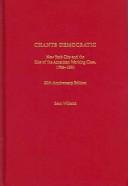
ISBN: 0195174496 019517450X 0198038917 1280844841 1429438118 9780198038917 9780195174502 9781429438117 9781280844843 0195174996 0199884005 0197712061 9780199884001 Year: 2004 Publisher: London, UK New York Oxford University Press
Abstract | Keywords | Export | Availability | Bookmark
 Loading...
Loading...Choose an application
- Reference Manager
- EndNote
- RefWorks (Direct export to RefWorks)
This text provides a panoramic chronicle of New York City's labour strife, social movements and political turmoil in the eras of Thomas Jefferson and Andrew Jackson.
Working class. --- Working class --- Business & Economics --- Labor & Workers' Economics --- History --- History. --- New York (N.Y.) --- Commons (Social order) --- Labor and laboring classes --- Laboring class --- Labouring class --- Working classes --- Employment --- Social classes --- Labor
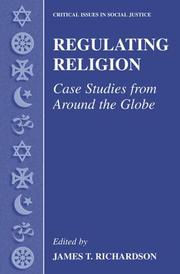
ISBN: 9780306478871 0306478870 Year: 2004 Publisher: New York: Kluwer Academic Publishers,
Abstract | Keywords | Export | Availability | Bookmark
 Loading...
Loading...Choose an application
- Reference Manager
- EndNote
- RefWorks (Direct export to RefWorks)
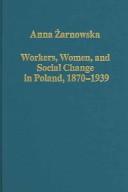
Abstract | Keywords | Export | Availability | Bookmark
 Loading...
Loading...Choose an application
- Reference Manager
- EndNote
- RefWorks (Direct export to RefWorks)
Working class --- Women --- Social change --- Travailleurs --- Femmes --- Changement social --- History --- Political activity. --- Histoire --- Pologne --- Activité politique --- Poland --- Social conditions. --- Politics and government --- Conditions sociales --- Politique et gouvernement --- Activité politique --- Revolution, 1905-1907 --- 1918-1945 --- 1796-1918 --- Social conditions --- Political activity --- Social mobility --- 20th century --- Commons (Social order) --- Labor and laboring classes --- Laboring class --- Labouring class --- Working classes --- Social classes --- Labor --- Mobility, Social --- Sociology --- Employment
Book
ISBN: 2724609352 Year: 2004 Publisher: Paris Presses de Sciences Po
Abstract | Keywords | Export | Availability | Bookmark
 Loading...
Loading...Choose an application
- Reference Manager
- EndNote
- RefWorks (Direct export to RefWorks)
Working class --- Travailleurs --- History --- Political activity --- Histoire --- Activité politique --- #SBIB:328H212 --- #SBIB:324H42 --- #SBIB:044.AANKOOP --- Instellingen en beleid: Frankrijk --- Politieke structuren: verkiezingen --- Activité politique --- Voting research --- Commons (Social order) --- Labor and laboring classes --- Laboring class --- Labouring class --- Working classes --- Voting --- Voting behavior research --- Employment --- Research --- Social classes --- Labor --- Elections

ISBN: 0521807484 0521002087 9780521807487 9780521002080 051118512X 9780511185120 0511185952 9780511185953 9780511499555 0511499558 128045766X 9781280457661 1107143985 0511187807 0511313802 0511186878 9781107143982 9780511187803 9780511313806 9780511186875 Year: 2004 Publisher: Cambridge, U.K. : Cambridge University Press,
Abstract | Keywords | Export | Availability | Bookmark
 Loading...
Loading...Choose an application
- Reference Manager
- EndNote
- RefWorks (Direct export to RefWorks)
Perhaps the most commonly held assumption in the field of development is that middle classes are the bounty of economic modernization and growth. As countries gradually transcend their agrarian past and become urbanized and industrialized, so the logic goes, middle classes emerge and gain in number, complexity, cultural influence, social prominence, and political authority. Yet this is only half the story. Middle classes shape industrial and economic development, they are not merely its product; the particular ways in which middle classes shape themselves - and the ways historical conditions shape them - influence development trajectories in multiple ways. This is the story of South Korea's and Taiwan's economic successes and Argentina's and Mexico's relative 'failures' through an examination of their rural middle classes and disciplinary capacities. Can disciplining continue in a context where globalization squeezes middle classes and frees capitalists from the state and social contracts in which they have been embedded?
Middle class --- Industrialization --- Classes moyennes --- Industrialisation --- -Middle class --- -Industrialization --- -#SBIB:39A4 --- #SBIB:39A74 --- #SBIB:39A75 --- Industrial development --- Economic development --- Economic policy --- Deindustrialization --- Bourgeoisie --- Commons (Social order) --- Middle classes --- Social classes --- Toegepaste antropologie --- Etnografie: Amerika --- Etnografie: Azië --- Social conditions --- #SBIB:39A4 --- Social Sciences --- Sociology
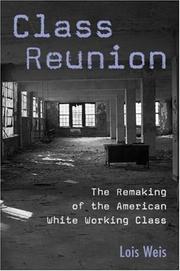
ISBN: 9786610171170 1280171170 0203684117 0203311574 0415949084 0415949076 1135932980 9780203684115 9780203311578 9781135932985 6610171173 9781280171178 9781135932930 9781135932978 9780415949071 9780415949088 1135932972 1594930775 Year: 2004 Publisher: New York : Routledge,
Abstract | Keywords | Export | Availability | Bookmark
 Loading...
Loading...Choose an application
- Reference Manager
- EndNote
- RefWorks (Direct export to RefWorks)
This book is a rare and valuable longitudinal ethnographic study that provides powerful, provocative insight into how the lives of these men and women have changed over the last two decades--and what their prospects might be for the future.
Economic conditions. --- Social classes. --- Social conditions. --- Working class. --- Working class whites. --- Social Science. --- Business. --- Labor & Workers' Economics --- Business & Economics --- Working class whites --- Working class --- Social classes --- Commons (Social order) --- Labor and laboring classes --- Laboring class --- Labouring class --- Working classes --- White working class --- Whites, Laboring class --- Whites, Working class --- Employment --- Labor --- Caucasian race --- Whites --- White working class people --- White people --- Working class white people
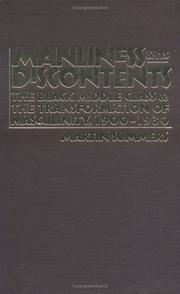
ISBN: 080786417X 9780807864173 9780807828519 0807828513 9780807855195 0807855197 9798890877536 Year: 2004 Publisher: Chapel Hill : University of North Carolina Press,
Abstract | Keywords | Export | Availability | Bookmark
 Loading...
Loading...Choose an application
- Reference Manager
- EndNote
- RefWorks (Direct export to RefWorks)
In a pathbreaking new assessment of the shaping of black male identity in the early twentieth century, Martin Summers explores how middle-class African American and African Caribbean immigrant men constructed a gendered sense of self through organizational life, work, leisure, and cultural production. Examining both the public and private aspects of gender formation, Summers challenges the current trajectory of masculinity studies by treating black men as historical agents in their own identity formation, rather than as screens on which white men projected their own racial and gender anxieties
African American men --- Immigrants --- Men --- Masculinity --- Sex role --- Middle class --- African Americans --- Bourgeoisie --- Commons (Social order) --- Middle classes --- Social classes --- Masculinity (Psychology) --- Sex (Psychology) --- Human males --- Human beings --- Males --- Effeminacy --- Emigrants --- Foreign-born population --- Foreign population --- Foreigners --- Migrants --- Persons --- Aliens --- Afro-American men --- Men, African American --- Social conditions --- Identity --- History --- United States --- Race relations. --- Race question
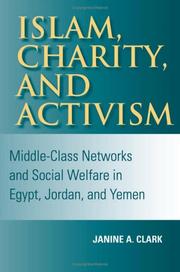
ISBN: 9786612071560 1282071564 0253110750 9780253110756 0253343062 0253216265 9780253343062 9780253216267 Year: 2004 Publisher: Bloomington, Ind. : Indiana University Press,
Abstract | Keywords | Export | Availability | Bookmark
 Loading...
Loading...Choose an application
- Reference Manager
- EndNote
- RefWorks (Direct export to RefWorks)
Throughout the Middle East, Islamist charities and social welfare organizations play a major role in addressing the socioeconomic needs of Muslim societies, independently of the state. Through case studies of Islamic medical clinics in Egypt, the Islamic Center Charity Society in Jordan, and the Islah Women's Charitable Society in Yemen, Janine A. Clark examines the structure and dynamics of moderate Islamic institutions and their social and political impact. Questioning the widespread assumption that
Islam --- Middle class --- Charities --- Social institutions --- Bourgeoisie --- Commons (Social order) --- Middle classes --- Social classes --- Alms and almsgiving --- Benevolent institutions --- Charitable institutions --- Endowed charities --- Institutions, Charitable and philanthropic --- Philanthropy --- Poor relief --- Private nonprofit social work --- Relief (Aid) --- Social welfare --- Associations, institutions, etc. --- Poor --- Social service --- Endowments --- Institutions, Social --- Social systems --- Sociology --- Social structure --- Alms and almsgiving (Islam) --- Charities. --- Social conditions --- Societies, etc. --- Services for
| Listing 1 - 10 of 23 | << page >> |
Sort by
|

 Search
Search Feedback
Feedback About UniCat
About UniCat  Help
Help News
News